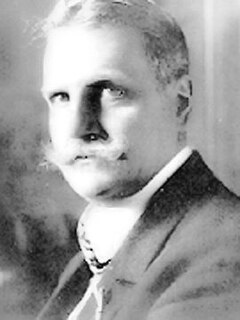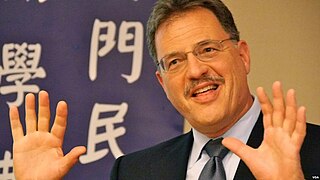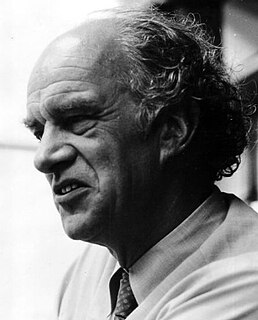
Democracy is a form of government in which the people have the authority to deliberate and decide legislation, or to choose governing officials to do so. Who is considered part of "the people" and how authority is shared among or delegated by the people has changed over time and at different rates in different countries, but over time more and more of a democratic country's inhabitants have generally been included. Cornerstones of democracy include freedom of assembly, association and speech, inclusiveness and equality, citizenship, consent of the governed, voting rights, freedom from unwarranted governmental deprivation of the right to life and liberty, and minority rights.
The New Deal Coalition was an American political coalition that supported the Democratic Party from 1932 until the late 1960s. The coalition is named after President Franklin D. Roosevelt's New Deal programs and was composed of voting blocs who supported Roosevelt's response to the Great Depression. At various points, the coalition included labor unions, blue collar workers, racial and religious minorities, farmers, rural white Southerners, and urban intellectuals. The coalition played a significant role in American politics until the mid-1960s, when it fractured over racial and economic issues.

Political sociology is an interdisciplinary field of study concerned with exploring how power and oppression operate in society across micro to macro levels of analysis. Interested in the social causes and consequences of how power is distributed and changes throughout and amongst societies, political sociology's focus ranges across individual families to the State as sites of social and political conflict and power contestation.

The iron law of oligarchy is a political theory first developed by the German-born Italian sociologist Robert Michels in his 1911 book, Political Parties. It asserts that rule by an elite, or oligarchy, is inevitable as an "iron law" within any democratic organization as part of the "tactical and technical necessities" of organization.

Political Parties: A Sociological Study of the Oligarchical Tendencies of Modern Democracy is a book by the German-born Italian sociologist Robert Michels, published in 1911 and first introducing the concept of iron law of oligarchy. It is considered one of the classics of social sciences, in particular sociology and political science.
A party system is a concept in comparative political science concerning the system of government by political parties in a democratic country. The idea is that political parties have basic similarities: they control the government, have a stable base of mass popular support, and create internal mechanisms for controlling funding, information and nominations.
Modernization theory is used to explain the process of modernization within societies. Modernization theory originated from the ideas of German sociologist Max Weber (1864–1920), which provided the basis for the modernization paradigm developed by Harvard sociologist Talcott Parsons (1902–1979). The theory looks at the internal factors of a country while assuming that with assistance, "traditional" countries can be brought to development in the same manner more developed countries have been. Modernization theory was a dominant paradigm in the social sciences in the 1950s and 1960s, then went into a deep eclipse. It made a comeback after 1991 but remains a controversial model.

Seymour Martin Lipset was an American sociologist. His major work was in the fields of political sociology, trade union organization, social stratification, public opinion, and the sociology of intellectual life. He also wrote extensively about the conditions for democracy in comparative perspective. A socialist in his early life, Lipset later moved to the right, and was often considered a neoconservative.

Larry Jay Diamond is an American political sociologist and leading contemporary scholar in the field of democracy studies. Diamond is a senior fellow at the Freeman Spogli Institute for International Studies, which is Stanford University's main center for research on international issues. At the Institute Diamond serves as the director of the Center on Democracy, Development, and the Rule of Law.
In political science and in international and comparative law and economics, transitology is the study of the process of change from one political regime to another, mainly from authoritarian regimes to democratic ones.
Adam Przeworski is a Polish-American professor of political science specializing in comparative politics. He is professor at the Wilf Family Department of Politics of New York University. He is a scholar of democratic societies, theory of democracy, social democracy and political economy, as well as an early proponent of rational choice theory in political science.
Union Democracy: The Internal Politics of the International Typographical Union is a book by Seymour Martin Lipset, Martin Trow and James S. Coleman, originally published by New York Free Press in 1956.

In political science and sociology, a cleavage is a historically determined social or cultural line which divides citizens within a society into groups with differing political interests, resulting in political conflict among these groups. Social or cultural cleavages thus become political cleavages once they get politicized as such. Cleavage theory accordingly argues that political cleavages predominantly determine a country's party system as well as the individual voting behavior of citizens, dividing them into voting blocs. It is distinct from other common political theories on voting behavior in the sense that it focuses on aggregate and structural patterns instead of individual voting behaviors.

Liberal democracy, also referred to as Western democracy, is the combination of a liberal political ideology that operates under an indirect democratic form of government. It is characterised by elections between multiple distinct political parties, a separation of powers into different branches of government, the rule of law in everyday life as part of an open society, a market economy with private property, and the equal protection of human rights, civil rights, civil liberties and political freedoms for all people. To define the system in practice, liberal democracies often draw upon a constitution, either codified or uncodified, to delineate the powers of government and enshrine the social contract. After a period of expansion in the second half of the 20th century, liberal democracy became a prevalent political system in the world.

Dankwart Alexander Rustow was a professor of political science and sociology specializing in comparative politics. He is prominent for his research on democratization. In his seminal 1970 article 'Transitions to Democracy: Toward a Dynamic Model,' Rustow broke from the prevailing schools of thought on how countries became democratic. Disagreeing with the heavy focus on necessary social and economic pre-conditions for democracy, he argued that national unity was the necessary precondition for democracy.

Larry Martin Bartels is an American political scientist and the Co-Director of the Center for the Study of Democratic Institutions and Shayne Chair in Public Policy and Social Science at Vanderbilt University. Prior to his appointment at Vanderbilt, Bartels served as the Donald E. Stokes Professor of Public Policy and International Relations and founding director of the Center for the Study of Democratic Politics at the Woodrow Wilson School of Public and International Affairs at Princeton University. He was elected a Member of the American Philosophical Society in 2019.
In social sciences, a cross-cutting cleavage exists when groups on one cleavage overlap among groups on another cleavage. "Cleavages" may include racial, political, religious divisions in society. Formally, members of a group j on a given cleavage x belong to groups on a second cleavage y with members of other groups k, l, m, etc. from the first cleavage x. For example, if a society contained two ethnic groups that had equal proportions of rich and poor it would be cross-cutting. While the concept may have been around since antiquity the formalizing of it originated with James Madison in The Federalist, Number 10. Robert A. Dahl built a theory of Pluralist democracy which is a direct descendant of Madison's cross-cutting cleavages. The term's antonym is reinforcing cleavages", which would be the case of one of the ethnic groups being all rich and the other all poor. The term originates from Simmel (1908) in his work Soziologie.
In United States politics, the radical right is a political preference that leans towards extreme conservatism, nationalist white supremacism, and other right-wing ideologies in hierarchical structure paired with conspiratorial rhetoric alongside traditionalist and reactionary aspirations. The term was first used by social scientists in the 1950s regarding small groups such as the John Birch Society in the United States and since then it has been applied to similar groups worldwide. The term "radical" was applied to the groups because they sought to make fundamental changes within institutions and remove from political life persons and institutions that threatened their values or economic interests.
Extremism of the centre is a term in sociology introduced by Seymour Martin Lipset. In his book Political Man (1960) he wrote that left-wing extremism has its basis in the lower classes and the working class, while right-wing extremism is anchored in the upper classes, and fascism originates in the socioeconomic middle class. He did not define the term fascism further. This analysis was extended by the sociologist Theodor Geigers, who explained the election success of the Nazi Party in the early 1930s as a reaction from the Mittelstand, and related his analysis to the contemporary analysis of extremist and anti-democratic movements of the middle of society. This added a new type to the extremism of the left and right, and explained fascism as a typically middle-class movement.
Critical juncture theory focuses on critical junctures, i.e., large, rapid, discontinuous changes, and the long-term causal effect or historical legacy of these changes. Critical junctures are turning points that alter the course of evolution of some entity. Critical juncture theory seeks to explain both (1) the historical origin and maintenance of social order, and (2) the occurrence of social change through sudden, big leaps.










